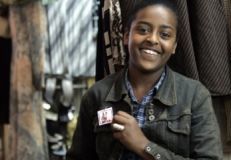Ethiopian PM cracks down after opposition protests in election
ADDIS ABABA, May 15 (AFP) — Ethiopia’s Prime Minister Meles Zenawi banned all public demonstrations in the capital and assumed direct control of the security forces after elections that the opposition said were marred by widespread fraud.

|
|
A shopkeeper shows a badge of the main Ethiopian opposition party CUD (Coalition for Unity and Democracy) 14 May 2005 in the old Mercato (market) in Addis Ababa, Ethiopia. (AFP). |
Meles, widely thought to have won a third term in the polls, said he took the steps to ensure post-election stability despite huge voter turnout and praise from international observers who doubted the opposition charges.
In a nationally televised address, he called the election a success but said the moves were necessary to counter “havoc” and “fear” created by opposition charges of abuses and a threat to reject the results.
“As of tomorrow, for the next one month no demonstrations of any sort will be allowed within the city and its environs,” Meles said, speaking in Ethiopia’s national language of Amharic.
“As peace should be respected … the government has decided to bring all the security forces, the police and the local militias, under one command accountable to the prime minister.”
In response to questions posed by two local journalists after his announcement, Meles said there was no reason to fear trouble and stressed the steps he was taking were aimed at guarding against post-election violence.
“We are not expecting any big danger, but as a government there is a role to play in looking after the peace and harmony of the people,” he said. “This action is just simply a precaution to see that no one is endangered.”
Although Sunday’s election was peaceful with only a handful of scattered reports of localized minor disturbances, Meles allowed last week that post-election violence was a possibility.
In an interview with AFP on Friday, the prime minister warned potential adversaries not to try to take advantage of that possibility, saying whatever problems might occur would not force the fall of the government.
“There may be incidents of violence here and there but there is not going to be a ‘Rose Revolution’ or a ‘Green Revolution’ or any color revolution in Ethiopia after the election,” Meles said, referring to the 2003 popular revolt that ousted the former government of Georgia and current unrest in Central Asia.
It was not immediately clear if the opposition would carry through on its threat to reject the results of the election — the first official counts of which were not be released until Tuesday — or defy the ban on demonstrations.
However, Hailu Shawl, the chairman of the Coalition for Unity and Democracy (CUD) and a strong advocate for rejecting the election results, blasted Meles’ for what he said was a heavy-handed attempt to curtail civil liberties.
“He is trying to stifle the feelings of the people,” he told AFP. “Whether they want to celebrate or complain they should be free to express themselves.”
The CUD, along with the United Ethiopian Democratic Forces (UEDF), has accused Meles’ ruling Ethiopian People’s Revolutionary Democratic Front (EPRDF) of orchestrating a campaign to harass and intimidate the opposition and rig the vote.
Government officials have dismissed the complaints and appeared to get something of a boost on Sunday when the two main international election observation missions said there was no evidence to back up the protests.
The European Union and the US-based Carter Center said they had been unable to verify claims of mass arrests of opposition activists and reported only minor, localized incidents.
With long lines of people still snaking out of voting centers in the capital and elsewhere as the 6 pm (1500 GMT) official closing time passed, election authorities said polls would remain open to those still waiting.
Any of the 26 million registered voters in line at one of the more than 30,000 polling stations before the deadline will be allowed to vote, said a spokesman for the National Electoral Board.
Meles, 50, who has run the country since the 1991 ouster of a Soviet-backed dictatorship, is hoping the vote will affirm the policies of his west-leaning center-left policies and showcase Ethiopia’s burgeoning democracy.
Land ownership, food security, taxes and unemployment were the main bones of contention in the ethnically diverse republic although analysts say there was little real distinction between the rivals.
Voters were electing representatives for eight of nine state councils and 524 of the 547 seats in the federal parliament. Elections in the pastoralist Somali region were due to be held in August.
